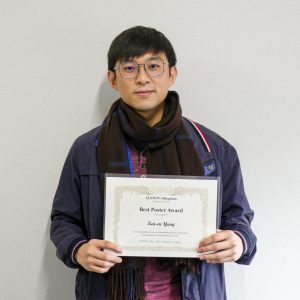2023年03月13日
【Awards and Commendations】 Kai-en, YANG, Sakai labo, Department of Nuclear Engineering and Management, (D1), received “Best Poster Award” at Q-STEP Colloquium
On 28th Feb 2023, Kai-en, YANG, Sakai labo, Department of Nuclear Engineering and Management, (D1), received “Best Poster Award” at Q-STEP Colloquium.
〈Name of award and short explanation about the award〉
Best Poster Award
It was given for the best posters in the Q-STEP Colloquium.
〈About awarded research〉
Title: Data-driven POD-based Reduced Order Model (ROM) for Research on Complex Granular System: Focusing on Bead Milling Process
Bead milling is a widely applied process for the dispersion and/or grinding of fine particles in the chemical industry. Previously, the research on it suffered the computational cost caused by the huge total amount of particles and the inapplicability of the coarse-grain model hinders the development of related research. We introduce a novel data-driven approach aiming at a faster, robust, and industrially applicable solution for bead milling simulation, named LPOD-based ROM (Lanczos Proper Orthogonal Decomposition based Reduced Order Model). Empowered by LPOD, the main flow structure and corresponding coefficients (weight and dominance of each mode) are extracted efficiently. Further, the temporal relationships among all coefficients are revealed, and learned by a neural network (e.g., RBF (Radial Basic Functions), LSTM (Long-Short term memory)). Consequently, the trained neural network can reconstruct the reduced-order solutions over time. It is also found the time-step is a crucial factor for the performance of LPOD-based ROM. This approach demonstrates a drastically faster manner compared to the conventional DEM-CFD with adequate accuracy and flexibility. The LPOD-based ROM can promisingly serve as a fast, flexible, and robust surrogate model for further research of the bead milling process and other complex granular systems.
〈Your impression & future plan〉
It is my pleasure to be awarded one of the best posters in the Q-STEP colloquium, where numerous quantum science research was presented. My highest appreciation belongs to all the Sakai Lab members, especially Prof. Sakai, Dr. Shuo Li, and Dr. Guangtao Duan. Laser-focusing on the bead milling process, I will commit myself to the research aiming at improving the proposed method to benefit the studies on granular systems in the future.



